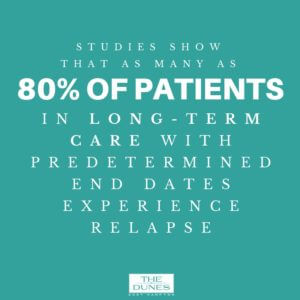
Contrary to popular belief, extended care and long-term addiction treatment programs are not the same. In fact, each is a step along the road to addiction recovery.
What Sets Extended Care And Long Term Apart?
Long-term care can last 90 days or longer and usually takes place at a residential facility. In general, extended-care treatment is initiated after long-term care and is often considered an extension of the addiction treatment programs. Extended care may include outpatient treatment, support group participation, sober concepts, and private or individualized therapy.
Success Rates
Compared to extended care treatment options that offer flexible end dates, long-term facilities have a much lower success rate if patients are released based on the number of days (30, 60, 90 days, etc.) in the program instead of their progress. Studies show that as many as 80% of patients in long-term care with pre-determined end dates experience relapse.
Staff Qualifications
Addiction treatment specialists working in long-term centers, in general, have more training in managing the underlying causes of addiction. This is because staff at these facilities spend a great deal of time with patients, working to heal them throughout the recovery process.
Extended-care programs, on the other hand, usually offer newer or alternative methods. These staff members may be trained to approach problems using non-traditional methods to help find the best solution for individual patients. Many extended-care programs also seek out the root cause of the addiction or disorder so it can be treated more effectively.
Freedom
This is the biggest difference for the two treatment types. Long-term facilities most often have predetermined end dates for treatment while extended-care programs set release dates based on performance and condition of individual patients. This cookie-cutter approach is the primary reason so many long-term programs result in relapse – patients are often unprepared for their time alone and fall short of expectations.
Accountability
There is often a disparity when it comes to patient accountability at these two facilities. Long-term care is designed for people who have relapsed. In long-term care, there may be less pressure to pursue a drug-free life since so many patients are repeat offenders.
Extended care is engineered to give patients the skills needed to enjoy a life without drugs and alcohol. Therapists and staff work to prevent relapse and help patients build healthier habits and develop coping mechanisms within the brain.







